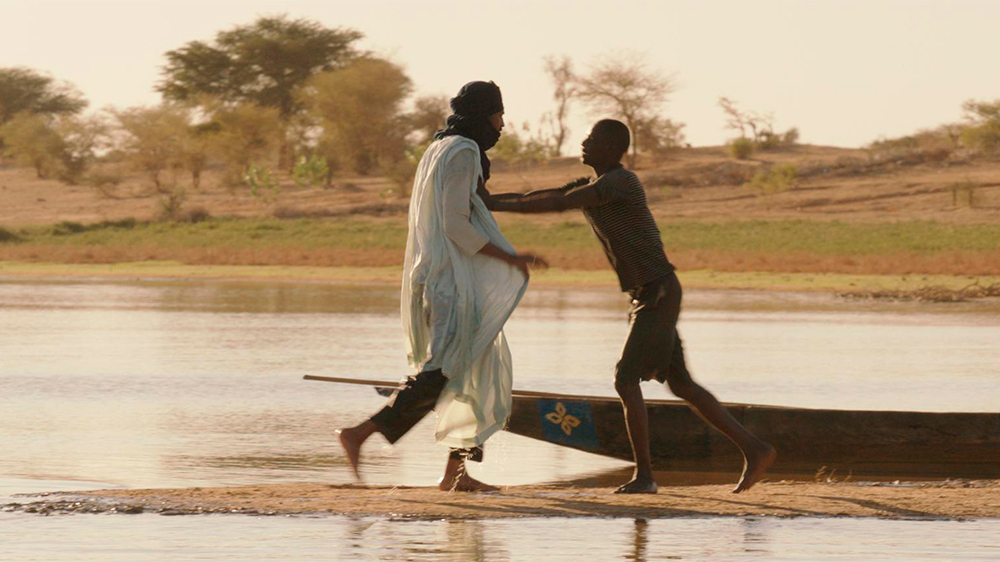By Chlotrudis Independent Film Society
Rating: 5 cats
Director: Abderrahmane Sissako
Starring: Abel Jafri | Cheik A.G. Emakni | Ibrahim Ahmed dit Pino | Layla Walet Mohamed | Mehdi A.G. Mohamed | Toulou Kiki

Country: france, mauritania
Year: 2015
Running time: 97
IMDB: https://www.imdb.com/title/tt3409392/reference
Jason says: “It’s a bit odd that the first film from Mauritania to be nominated for an Academy Award is about Mali, but this isn’t the sort of movie that a country generally makes about itself until much later in its history. We’re lucky that TIMBUKTU is getting that extra little bit of attention and wider theatrical release that comes with being an Oscar nominee, at least, as it’s a terrific little movie. The combination of earnest tragedy and achingly painful absurdity can be hard to stomach, but it’s harder still to look away.
“It takes place in and around the ancient Malian city of the title, during the Northern Mali Conflict of 2012, and the new men in power are making sure that things are being done in accordance with the stricter new laws: Women in the marketplace must wear gloves and socks in addition to covering their heads, for instance, and music is strictly outlawed. Enforcement is rather more lax in the sparsely-settled lands outside the city, where laid-back cattle farmer Kidane (Ibrahim Ahmed dit Pino) plays guitar and floats the idea of giving a forthcoming calf to Issan (Mehdi A.G. Mohamed), the orphaned boy his family has taken in, with wife Satima (Toulou Kiki) and 12-year-old daughter Toya (Layla Walet Mohamed). They cannot entirely avoid the changes around them, though, and it may not just be the tendency of jihadist Abdelkrim (Abel Jafri) and his translator Omar (Cheik A.G. Emakni) to pay visits when Kidane is our walking the property that brings thing to a head.
“It’s a bit unfair to present TIMBUKTU as entirely, or even primarily, being about Kidane and his family, although most of us do it because theirs is the story that comes closest to running from start to finish, and also the one where everybody involved has their name spoken out loud. It allows us to build a quick rapport with the group and lets them be a quiet commentary on what’s going on elsewhere until their own story ramps up – director Abderrahmane Sissako will do obvious things like cutting to Kidane playing guitar as the jihadists enforce a no-music rule in the city, often underlining that what is happening in the city is not about Islam itself – this family shares the same religion but clearly practices it differently. In fact, one can argue that their travails have little to do with the rebellion besides generally heightened tensions that Kidane perhaps underestimates because they don’t affect him like they do Satima and Toya.
“They do also run into something which I suspect is kind of key: The jihadists are attempting to enforce a single culture in a region whose diversity is clear from the multiple languages which are being spoken: French, Bambara, Songhay, Arabic, occasionally English as a common language, and (I think) one more. The result is an often-fascinating mix of confusion and absurdity. For instance, a patrol group looking for the source of the music that their denomination prohibits radios in, unsure what to do when they realize it is praise being sung to Allah. Men discussing international football stars later deliver a flogging to someone seen kicking a ball through town, leading to a downright surreal scene afterward. An even stranger sort of hypocrisy occurs when one jihadist attempts to film another renouncing the time he used to spend performing music, giving direction when the man clearly isn’t into it. The city scenes are depictions of fundamentalist arrogance that feel like they are about one centimeter away from being satire, except that they blend into the more banal cruelty too well.
“Walking that line must be a difficult task, but Sissako and his cast & crew handle it with apparent ease. Scenes are set without preamble, but the important details always become clear very quickly, whether it be the personalities and relationships within a family or cultural issues where an American viewer such as myself may only have a relatively vague understanding. The craft is incredibly strong, as well; for example, consider how sparingly music must be used on the score when there is so much on-screen talk of it being forbidden. Sissako and composer Amin Bouhafa must use its absence as a way to create tension in certain scenes while going for a conventional score elsewhere. He also does a nice job of using the desert song to highlight how close to certain edges these people are – Kidane’s fields seem to be the bar minimum of fertility for grazing animals, while the sandstone structures of the city seem to have just grown from the desert. There’s also some very nice cinematography – I’m not entirely sure how the filmmakers signaled my eye to look at one edge of the screen after all the movement had drawn it to the other in one case.
“All this focus on authenticity and detail extends to the cast. It’s not necessarily the most naturalistic set of preformed one will ever see, but if the various actors push a moment a little bit more, there is generally a good reason for that emphasis, and it never comes close to being theatrical enough to truly remind the audience that they’re song a show.
“Mali still faces a certain amount of turmoil, but in many ways, TIMBUKTU is not just about its conflict, but the use of force and violence in general leads to more, and how going to a place and seeing something that bothers you is not an attack to be repelled. Simple messages, perhaps, but Sissako has a lack for getting them across with quiet assurance. 5 cats
“Seen 21 February 2015 in Landmark Kendall Square #9 (first-run, DCP)”
